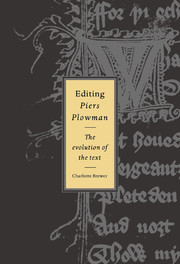Book contents
- Frontmatter
- Contents
- Acknowledgements
- Abbreviations
- Note on the texts
- Introduction
- Part I The early phase
- 1 Crowley
- 2 Percy, Warton, Tyrwhitt, Ritson
- 3 Whitaker and Price
- 4 Wright
- Part II The late nineteenth century
- Part III The Skeat aftermath
- Part IV Chambers and Grattan, Knott and Fowler
- Part V The Athlone Press edition
- Part VI Epilogue: the Athlone aftermath: Schmidt, Pearsall, Rigg-Brewer, et al.
- Works cited
- General index
- Index of manuscripts
- CAMBRIDGE STUDIES IN MEDIEVAL LITERATURE
1 - Crowley
Published online by Cambridge University Press: 20 August 2009
- Frontmatter
- Contents
- Acknowledgements
- Abbreviations
- Note on the texts
- Introduction
- Part I The early phase
- 1 Crowley
- 2 Percy, Warton, Tyrwhitt, Ritson
- 3 Whitaker and Price
- 4 Wright
- Part II The late nineteenth century
- Part III The Skeat aftermath
- Part IV Chambers and Grattan, Knott and Fowler
- Part V The Athlone Press edition
- Part VI Epilogue: the Athlone aftermath: Schmidt, Pearsall, Rigg-Brewer, et al.
- Works cited
- General index
- Index of manuscripts
- CAMBRIDGE STUDIES IN MEDIEVAL LITERATURE
Summary
The history of the publication of Piers Plowman begins with the three quarto editions of Robert Crowley. All three were printed in the year 1550, as a result, presumably, of popular demand; and this success with the public makes Crowley unique among the editors of the poem. Crowley's work performs a very different function from that of subsequent editions. He attempts to make the poem mesh with current issues in a way unparalleled by later editors, for whom the poem has become more of a historical curiosity. For Crowley it is part of a vibrant and directly relevant past, which can explain or at least shed light on current events. His address to the reader, and his marginal annotations on the text of the poem, reveal that he saw the poem as making a significant contribution to current religious and political issues. At the same time, he shows an antiquarian interest in uncovering as much as he can about the author and the circumstances under which the poem was written.
From its first reception, Piers Plowman was allied with Catholic or anti-Catholic reforms of one sort or another. Contemporary records report that the name ‘Piers Plowman’ was used as a rallying cry in the so-called Peasants' Revolt of 1381, and this misunderstanding of Langland as a radical revolutionary heralded the sixteenth-century interpretation of him as a crypto-proto-Protestant. Langland many times throughout his poem calls for reform of a corrupt society, particularly of its clerical elements, but always in terms that implicitly or explicitly reinforce traditional social and religious structures.
- Type
- Chapter
- Information
- Editing Piers PlowmanThe Evolution of the Text, pp. 7 - 19Publisher: Cambridge University PressPrint publication year: 1996

